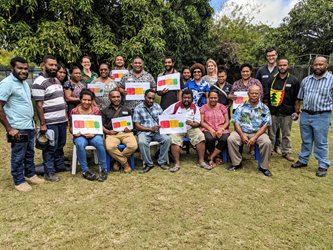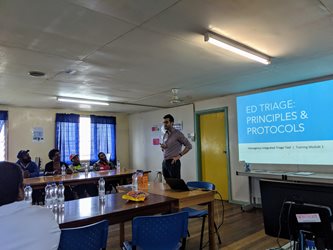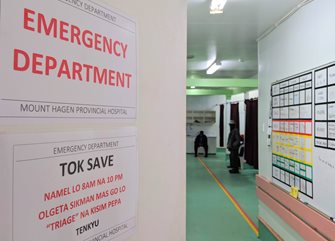 ACEM last week completed the preliminary monitoring and evaluation of the Mount Hagen Provincial Hospital triage program, funded by the Australian Government Friendship Grants program.
ACEM last week completed the preliminary monitoring and evaluation of the Mount Hagen Provincial Hospital triage program, funded by the Australian Government Friendship Grants program.
The College has been working in Papua New Guinea for more than 15 years, supporting capacity development of local providers to deliver safe and effective emergency care – a core component of universal health care – to enable readily available and accessible emergency care to all community members.
Prior to the program Mount Hagen Provincial Hospital had no systems for triage, patient flow or emergency department data management. Each year the referral hospital services 470,000 community members across four districts in the Western Highlands Province. Staff who identified the lack of these systems asked for ACEM’s help to develop, implement and evaluate a triage system.
Dr John McKup, a specialist medical officer in emergency medicine at MHPH, says: ‘All patients who attend MHPH ED will now be registered and triaged on arrival. Under the new system, emergency doctors will see patients in order of urgency, not by time of arrival.’ 
The triage system was developed with input from ACEM, MHPH and Gerehu General Hospital (GGH), with support of an Australian Government Australian Aid Friendship Grant. The parties initially adapted and field-tested a three-tier triage tool developed by the World Health Organization (WHO), the International Committee of the Red Cross and Medecins sans Frontieres.
A pre-release version of the tool was provided by the WHO’s Emergency and Trauma Team in Geneva and then contextualised for the PNG setting. The tool is not yet publicly available, and this project, in part, aimed to field test the system in a real-world setting.
The triage system was then trialeled in a roll-out at GGH, a major hospital in the Port Moresby District that services up to 489,000 community members. The triage system yielded immediate improvement to patient management and care.
‘The new triage system allows us to identify patients who need immediate treatment,’ GGH director of emergency medicine Dr Ovia Bue says.
Following the trial the system was finessed and implemented at MHPH by the ACEM team and hospital staff, along with emergency department monitoring and a database system.
Under the new system the emergency department is colour-coded.
‘Patients requiring resuscitation are taken to the red area. Patients with other needs may be directed to yellow and green areas. This simple system will help ensure that we can provide the best possible care to the greatest number of patients,’ Dr McKup says.
Monitoring and evaluation of this project are ongoing. Further information and data is to be released shortly.
Background
The ACEM Global Emergency Care (GEC) Desk was established in 2019 and has made a significant increase in investment in ACEM's contribution to the Global Health Sector. The GEC Desk manages the portfolio of ACEM-supported projects in GEC, and is responsible for establishing partnerships that support locally led capacity development of emergency care in low and middle-income countries.
The GEC Desk will become a repository of resources and guidance for those interested in engaging responsibility in the GEC capacity development and volunteering. If you would like to learn more GEC or ACEM’s GEC activities and projects please email: [email protected].
More information about the Friendship Grants program is available from the Department of Foreign Affairs and Trade.
Photos: 1 and 2 Sarah Bornstein, 3 JP Miller